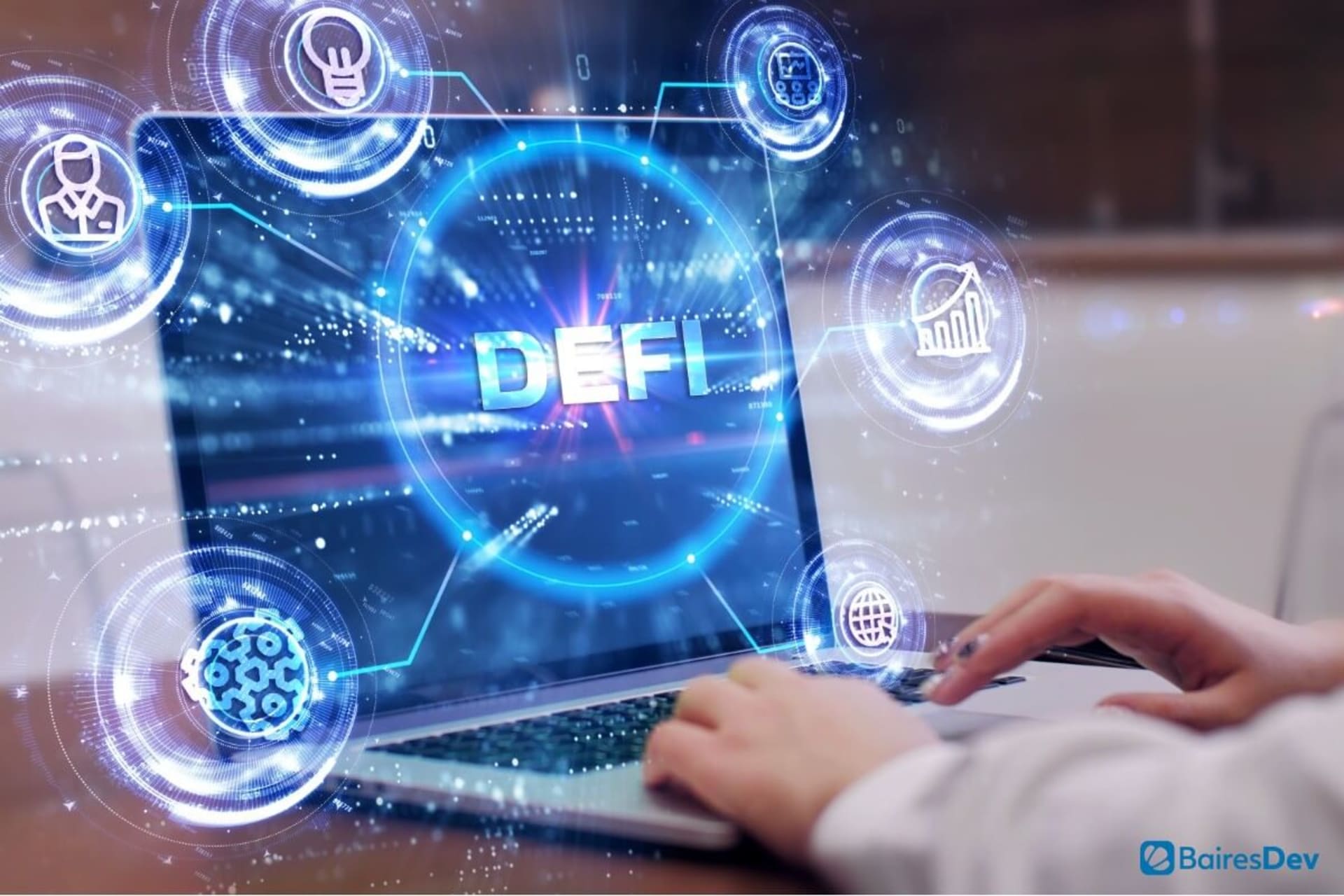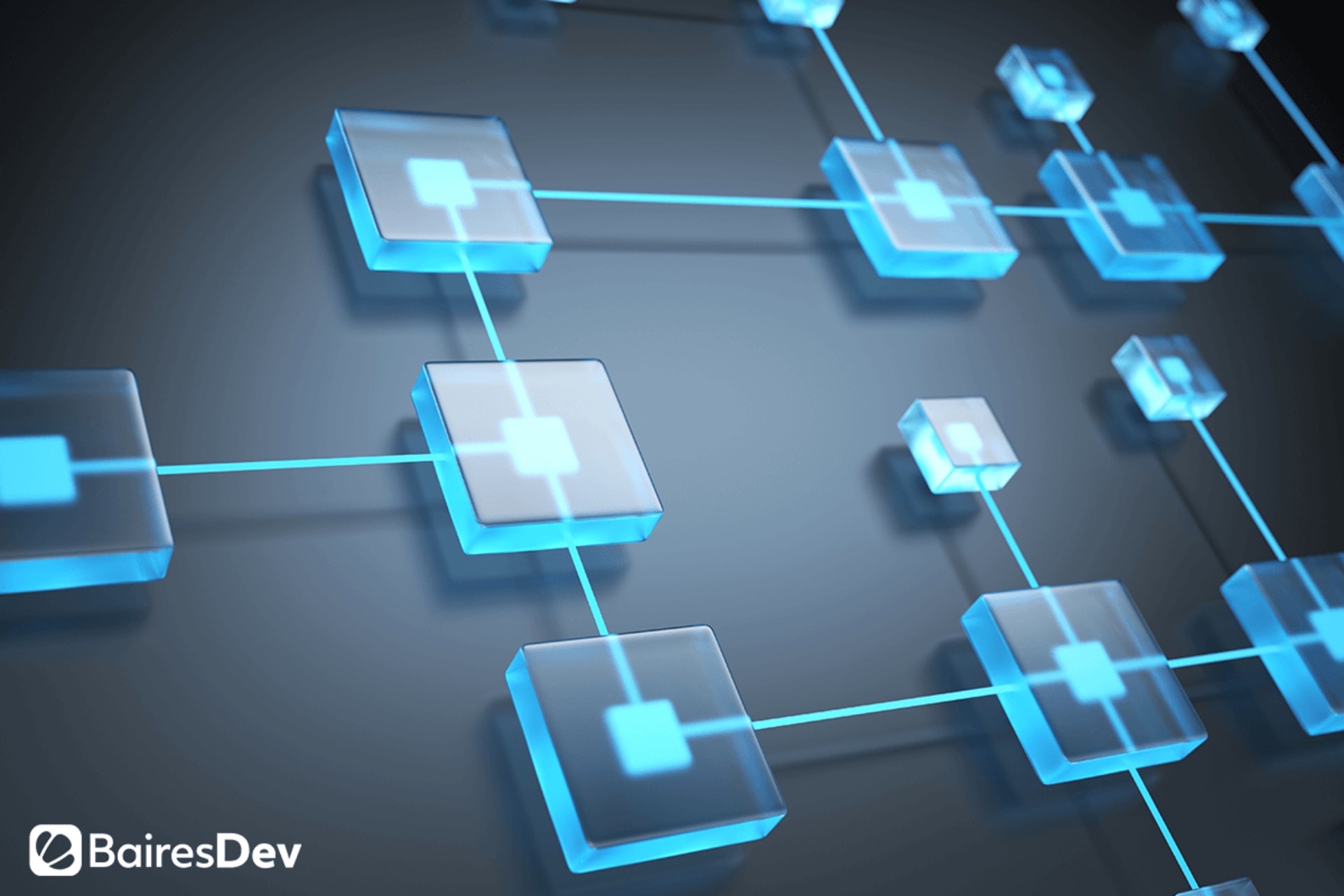Hire DeFi Developers
Our top 1% of tech talent has already undergone a rigorous vetting process. Get bilingual, nearshore DeFi developers on your team within 2 weeks.
500+ companies rely on our top 1% tech talent.
No time to find the top talent yourself? Skip the hassle of recruitment.



The Ultimate Guide for Hiring DeFi Developers
DeFi developers possess a unique blend of advanced blockchain expertise, a deep understanding of DeFi protocols, and the skill to tackle complex challenges under intense deadlines. This rare combination makes them some of the most in-demand—and hardest-to-hire—professionals. For businesses building DeFi platforms, the stakes couldn’t be higher.
This guide provides a straightforward framework for sourcing and evaluating experienced DeFi developers based on insights from our 1,200+ completed projects and network of 4,000+ vetted tech professionals.
Before You Start Hiring
Project or Team Requirements
Whether you're building a new DeFi platform, improving existing solutions, or auditing smart contracts, clear requirements help you hire DeFi developers whose expertise aligns with your objectives.
Portfolio and References/Testimonials
A developer’s portfolio reveals their technical skills and DeFi experience, such as deploying secure smart contracts or integrating with blockchain platforms. Client testimonials and references further validate their reliability and ability to deliver results in blockchain technology.
Prioritize Niche Expertise in Blockchain Technology
Whether you’re creating liquidity pools, building decentralized exchanges, or optimizing smart contracts for efficiency, hiring DeFi developers with a proven track record is essential. Experienced developers minimize risks, bring expertise in relevant programming languages, and align your project with industry standards.
Opt for Nearshore Defi Developers
Nearshore talent offers the advantage of real-time communication without the challenges of timezone differences. This is especially important for decentralized finance projects, where constant updates and rapid decision-making are critical to meeting deadlines and ensuring project success.
Evaluate Communication Skills
Strong communication skills keep every stakeholder aligned, reducing delays and misunderstandings while promoting collaboration across technical and non-technical teams.
20 Skills Every DeFi Developer Should Have
DeFi developers must excel in blockchain development, smart contract deployment, and understanding decentralized finance protocols. Equally important are soft skills like adaptability and problem-solving, which foster seamless collaboration and the flexibility to tackle complex challenges.
These skills directly influence the quality, security, and scalability of decentralized finance solutions, enabling you to deploy innovative and efficient platforms. Below, we outline the key technical and soft skills to look for when you hire DeFi developers, whether you're building decentralized exchanges, secure smart contracts, or innovative blockchain platforms.
Technical Skills to Look for in Your Ideal DeFi Developer
1. Proficiency in Solidity and Vyper
Proficiency in Solidity and Vyper enables developers to write secure smart contracts on Ethereum and other blockchain platforms. These languages are essential for smart contract development, providing the foundation for successful projects.
2. Experience with DeFi Protocols
Familiarity with major protocols, such as Uniswap and Aave, enables developers to integrate features like liquidity pools, lending systems, and staking mechanisms into your DeFi app development.
3. Smart Contract Auditing
Developers should be skilled in conducting smart contract audits using tools like MythX and Slither. This keeps your DeFi platform secure and minimizes vulnerabilities.
4. Knowledge of Blockchain Platforms
A strong grasp of platforms like Ethereum, Solana, and Binance Smart Chain allows developers to choose the right ecosystem for your DeFi project, ensuring scalability and performance.
5. Expertise in Token Standards
Profound knowledge of token standards like ERC-20 and ERC-721 is vital for creating tokens and NFTs, enabling versatile use cases within decentralized finance.
6. Web3.js and Ethers.js Proficiency
These libraries are critical for connecting DeFi platforms to blockchain networks, facilitating seamless interaction between the front-end interface and smart contracts.
7. Gas Optimization
Developers skilled in optimizing gas fees reduce operational costs and improve user experience. Efficient smart contract development can make your DeFi project cost-effective and scalable.
8. Building Decentralized Exchanges (DEXs)
Knowledge of decentralized exchanges, including AMMs and order books, enables your platform to handle complex trading functionalities with security and efficiency.
9. Full Stack Development Expertise
The best DeFi developers have both front-end and back-end experience and can handle complete DeFi development, ensuring your project delivers cohesive functionality and seamless user experiences.
10. Debugging and Testing
Familiarity with tools like Hardhat and Truffle for rigorous testing enhances the reliability of your DeFi platform, identifying and resolving potential issues before deployment.
11. Backend Integration
Developers skilled in API integration can connect your DeFi platform with external services, supporting real-time data and functionality.
12. Knowledge of Cryptography
A strong understanding of cryptographic principles supports secure data exchanges and wallet integrations, safeguarding users and assets within your platform.
13. Proficiency in Rust and Go
Languages like Rust and Go power many high-performance blockchain applications, offering scalability for decentralized finance solutions.
14. Performance Optimization
Optimizing smart contract execution enables your platform to handle large transaction volumes efficiently, a critical need for enterprise-grade projects.
15. Experience with Governance Systems
Developers that are able to solve complex technical problems with knowledge of decentralized governance mechanisms can implement voting systems and DAOs, enabling user-driven decision-making in your entire project.
16. Experience Deploying Smart Contracts
Developers who efficiently manage and deploy smart contracts keep your platform operating smoothly, even under changing conditions.
Soft Skills to Look for in Your Ideal DeFi Developer
17. Communication Skills
Developers must clearly explain technical processes, document their work, and align with team goals. Strong communication skills promote effective collaboration and reduce misunderstandings during DeFi development.
18. Problem-Solving
DeFi projects often involve unforeseen challenges, such as optimizing smart contracts or debugging complex systems. A problem-solving mindset allows developers to adapt and deliver innovative solutions.
19. Adaptability
With blockchain technologies constantly evolving, developers need to quickly adopt new tools, frameworks, and practices. Adaptability keeps them ahead of trends and enables them to bring the latest innovations to your DeFi platform.
20. Attention to Detail
Small errors in smart contracts can lead to significant security vulnerabilities. Developers who prioritize precision and thoroughness deliver reliable and secure projects.
12 Questions to Identify Top DeFi Developers
When interviewing DeFi developers, it's important to ask questions that first assess the candidates' technical skills and knowledge. Employers will also usually conduct a coding test to further assess specific on-the-job knowledge.
The following set of questions aims to uncover not only the developers's technical knowledge but also their problem-solving abilities, teamwork, communication skills, and adaptability—all crucial traits for success in a collaborative environment.
Here are a few examples of technical interview questions:
1. What steps do you take to secure smart contracts in a DeFi project?
Security is paramount in DeFi development. I begin by conducting a thorough smart contract audit using tools like MythX and Slither. I also write test cases to cover all possible attack vectors and implement best practices, such as restricting access controls and avoiding reentrancy vulnerabilities. Once deployed, I monitor the smart contracts and stay updated on emerging threats to apply fixes when necessary.
2. Can you explain the differences between Solidity and Vyper, and when you might use each?
Solidity is the go-to language for smart contract development on Ethereum due to its extensive ecosystem and tooling. Vyper, on the other hand, is designed for simplicity and security, making it ideal for contracts with minimal features but high reliability requirements. I choose the language based on the project’s needs. For instance, I used Vyper for a decentralized exchange where security was a priority.
3. How do you approach debugging a smart contract with a critical error?
Debugging starts with isolating the issue using tools like Hardhat or Remix. I analyze transaction logs to pinpoint where the error occurs and test different scenarios to understand its root cause. Recently, I debugged a DeFi app experiencing reentrancy issues, and I resolved it by adding appropriate checks and implementing the checks-effects-interactions pattern to prevent similar issues in the future.
4. What experience do you have with protocols like Uniswap or Aave?
I’ve worked on integrating protocols like Uniswap for token swaps and Aave for lending functionality. For example, I built a DeFi platform that leveraged Uniswap’s liquidity pools to enable real-time trading, ensuring seamless integration with its smart contract infrastructure. My experience helps me quickly adapt to different blockchain platforms and deploy innovative solutions.
5. How do you achieve scalability in a DeFi platform?
Scalability involves optimizing smart contracts, choosing the right blockchain platform, and designing an architecture that can handle high transaction volumes. For instance, I integrated a layer-2 scaling solution for a project on Ethereum, reducing transaction costs and improving throughput without compromising security.
6. What tools and frameworks do you use for testing smart contracts?
I use Truffle and Hardhat for writing and running unit tests, ensuring that every function performs as intended. For integration testing, I simulate interactions with blockchain networks using tools like Ganache. These frameworks allow me to identify and address issues before deploying the smart contracts to production.
7. Can you describe a time you solved a challenging issue in a DeFi project?
In a recent DeFi development project, I identified a vulnerability in a staking contract that exposed funds to potential exploits. I analyzed the logic, rewrote the function to close the loophole, and thoroughly tested it under different conditions. This fix not only secured the platform but also restored user confidence, which was critical for the platform’s growth.
8. Can you share an example of a challenging DeFi project you worked on and how you contributed to its success?
This question explores the candidate’s hands-on experience in DeFi development and their ability to tackle complex technical and organizational challenges. Their response will provide insight into how they approach problem-solving, their understanding of decentralized finance protocols, and their ability to deliver results under pressure. Additionally, it sheds light on their technical expertise with blockchain platforms and tools.
9. How have you maintained the security of smart contracts in previous projects?
This question helps evaluate the candidate’s ability to identify vulnerabilities, conduct smart contract audits, and implement best practices for securing assets and data. Their response also highlights their familiarity with tools like MythX, Slither, or Hardhat and their commitment to building secure smart contracts.
10. How do you stay updated on changes in blockchain technology and trends in DeFi protocols?
The blockchain development space evolves rapidly, and staying ahead of trends is critical. This question uncovers the candidate’s learning habits, engagement with industry communities, and adaptability to emerging DeFi platforms and tools.
11. Can you describe your experience collaborating with a team on a large-scale DeFi project?
Collaboration is key to the success of enterprise-level DeFi development. This question evaluates the candidate’s communication and teamwork skills, particularly their ability to work with diverse stakeholders, such as project managers, designers, and other developers. Their response will reveal how effectively they align with a team’s goals while contributing technical value.
12. What do you consider the most important technical skills for a DeFi developer, and how have you developed these skills?
This question highlights the candidate’s understanding of the critical technical skills needed for DeFi app development, such as proficiency in Solidity, experience with liquidity pools, and familiarity with decentralized exchanges. Their answer will reflect their level of expertise, commitment to growth, and alignment with your project requirements.
Frequently Asked Questions
How do I assess if a DeFi developer is the right fit for my specific business?
Assessing fit involves reviewing the developer’s experience with projects similar to your needs, such as building decentralized exchanges, integrating liquidity pools, or creating secure smart contracts. Evaluating the developers' communication and collaboration skills during hiring is essential for aligning with your team’s workflow and goals.
Should I hire a freelance DeFi developer or a dedicated team?
When deciding between freelance DeFi developers, or a dedicated team, it largely depends on the scope and complexity of your project. A freelance DeFi developer may be ideal for smaller tasks like optimizing smart contracts or conducting audits. For larger projects requiring end-to-end development, a dedicated team with specialists in front-end, back-end, and blockchain provides comprehensive support and scalability.
How long does it typically take to onboard a DeFi developer?
Onboarding timelines vary based on project complexity and the developer’s familiarity with your tech stack. However, highly skilled DeFi developers can typically integrate with an existing team within a week. Clear documentation of project requirements and well-defined goals can expedite the process and facilitate a smooth transition when onboarding DeFi developers.
How do DeFi developers achieve scalability for enterprise-grade applications?
Scalability is achieved by optimizing smart contracts, leveraging layer-2 solutions, and selecting the right blockchain networks for your project. DeFi developers might use rollups or sidechains to handle higher transaction volumes. Their expertise in these areas helps your DeFi platform scale with user demand while maintaining performance and reliability.
What is the importance of liquidity pools in DeFi, and how can developers build them?
Liquidity pools are essential for enabling trading and lending in decentralized apps. DeFi developers create them by writing smart contracts that manage token swaps and calculate fair pricing using algorithms. An experienced DeFi developer can optimize pool performance, minimize gas costs, and implement security measures to safeguard funds.
How do I make sure my project aligns with regulatory requirements?
Hire DeFi developers with experience in integrating compliance measures into decentralized finance solutions. Your DeFi developer should understand KYC (Know Your Customer) processes, AML (Anti-Money Laundering) protocols, and how to implement them within smart contracts. This keeps your platform compliant within legal frameworks while maintaining transparency and user trust.

- Hire DeFi Developers
How Businesses Can Overcome the Software Development Shortage
BairesDev Ranked as one of the Fastest-Growing Companies in the US by Inc. 5000









